While the public expresses a range of negative assessments of the government generally, there continues to be limited public outcry over personal tax burdens. At the same time, a majority say that most Americans want more from the government than they are willing to pay for in taxes.
Paying their ‘fair share’
Slightly more than half (54%) say they think they pay about the right amount in taxes, considering what they get from the federal government; 40% say they pay more than their fair share, while just 4% say they pay less than their fair share.
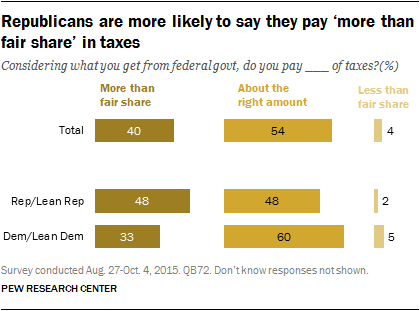
There are significant demographic and political differences when it comes to assessments of individual tax burdens.
Among Republicans and Republican-leaning independents, as many say they pay more than their fair share in taxes as say they pay about the right amount (both 48%), with no significant differences in views between conservatives and moderates and liberals.
Among Democrats and Democratic-leaning independents, 60% say that they pay about the right amount in taxes, considering what they get from the federal government, while only about half as many say they pay more than their fair share (33%).
Across age groups, the oldest and youngest adults are more likely than others to say they pay about the right amount of taxes. Two-thirds of those 65 and older (66%) and 58% of those ages 18-29 say they pay about the right amount of taxes. By contrast, fewer of those ages 30-49 (50%) or 50-64 (47%) say they pay the right amount.
Those with greater family incomes are somewhat more likely than others to say they pay more than their fair share. About half (51%) of those with annual family incomes of $100,000 or more and 48% of those with incomes between $75,000 and $99,999 say this, compared with 40% of those with incomes between $30,000 and $74,999 and just 34% of those with lower incomes. Similarly, those with post-graduate (45%) or college degrees (44%) are more likely than those who have not attended college (36%) to say they pay more than their fair share.
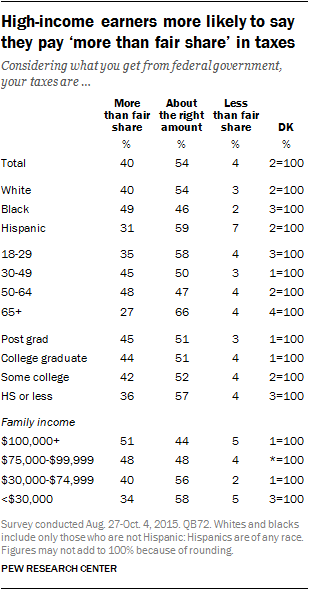
Among blacks, 49% say they pay more than their fair share, while about the same proportion (46%) say they pay about the right amount. Both Hispanics and whites are more likely to say they pay about the right amount than to say they pay more than their fair share.
Those who say they pay more than their fair share in taxes are somewhat more angry with government, and less trusting, than those who say they pay about the right amount or less than their share in taxes. Wider attitudinal differences emerge between the two groups over general assessments of government performance and impressions of government waste.
Among those who say they pay more than their fair share of taxes, considering what they get from the federal government, more say they are angry with government (31%) than content (13%), while 54% say they are frustrated. Views are less intensely negative among those who say they pay about the right amount or less than their share in taxes: just 17% of this group says they are angry with government compared with 25% who are content and 57% who are frustrated.
Similarly, the percentage who volunteer that they never trust the government to do what’s right is somewhat higher among those who think they pay more than their share in taxes (21%) than among those who say they pay the right amount or too little (9%).
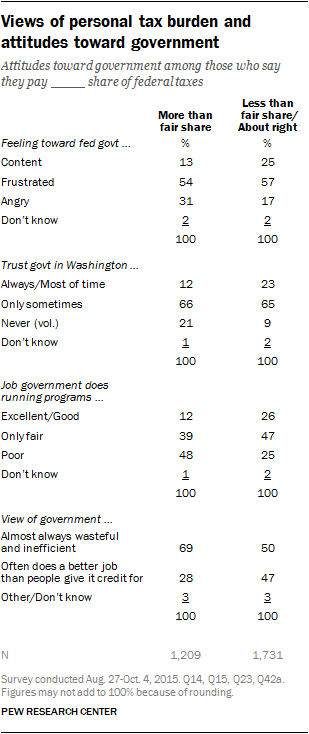
When it comes to an overall assessment of how well the federal government runs its programs, nearly half of those who say they pay more than their share of taxes (48%) say the government does a poor job running its programs, while 39% say they do an only fair job and just 12% say they do an excellent or good job. By contrast, 47% of those who say they pay about the right amount or less than their share in taxes say the government does an only fair job running programs; about as many say they do an excellent or good job (26%) as a poor job (25%).
Nearly seven-in-ten (69%) of those who say they pay more than their share in taxes view the government as almost always wasteful and inefficient, while just 28% say government often does a better job than people give it credit for. Views are much less negative among those who say they pay about the right amount or less than their fair share in taxes: 50% say the government is almost always wasteful and inefficient, while 47% say it often does a better job than people give it credit for.
Among both Republicans and Republican leaners and Democrats and Democratic leaners, the patterns on these questions are significant: Those who feel they pay more than their fair share in taxes are more critical of government than those who do not.
Does public demand more from government than it is willing to pay for?
When it comes to taxes and government services, many say Americans aren’t willing to pay for all the things they want government to do.
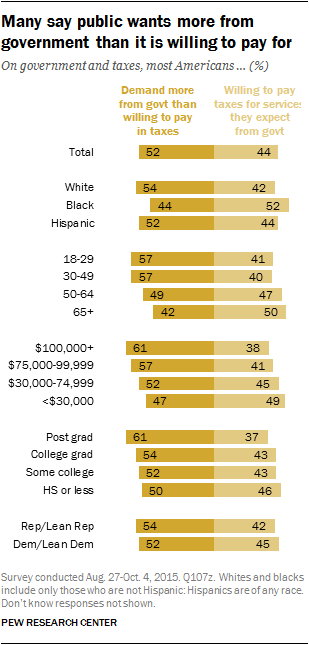
Overall, 52% say that most Americans demand more from the government than they are willing to pay taxes for, while somewhat fewer (44%) say most Americans are willing to pay the taxes needed to fund the services they expect government to provide.
There is general partisan agreement on this question: Most Republicans and leaners (54%) and Democrats and leaners (52%) say the public demands more from government than they are willing to pay for, with only modest differences across ideological lines within each party.
There are wider differences in these views by education, income, and race and ethnicity. In general, those with higher levels of education or higher incomes are among the most likely to say the public expects more from government than they are willing to pay for, while those with lower levels of education and income are more divided. For example, among those with family incomes of $100,000 a year or more, 61% say most Americans demand more from the government than they are willing to pay taxes for, while just 37% say most Americans are willing to pay taxes for the services they expect. By contrast, those earning less than $30,000 a year are divided, with about as many (49%) as not (47%) saying the public is willing to pay taxes to fund the services they expect.
Across racial and ethnic groups, whites (54%) and Hispanics (52%) are somewhat more likely than blacks (44%) to say the public is not willing to pay for the government services they demand.
A majority (57%) of those under age 50 say the public demands more from government than they are willing to pay for; views are mixed among those ages 50-64 (49% demands more, 47% is willing to pay for what it expects), and those 65 and older are slightly more likely (50%) than not (42%) to say the public is willing to pay for the services it expects from government.
Public’s top economic concerns
Overall, 31% say the federal budget deficit is the national economic issue that worries them most, while an equal share says the job situation is their top economic worry. Fewer consider rising prices (20%) or the condition of the financial and housing markets (13%) to be their top economic concern.
Partisans have differing perspectives on the most important national economic issue. A 44% plurality of Republicans and leaners say the budget deficit is their top economic worry, while 26% cite the job situation; relatively few say prices (16%) or the financial and housing markets (9%) are their top concern.
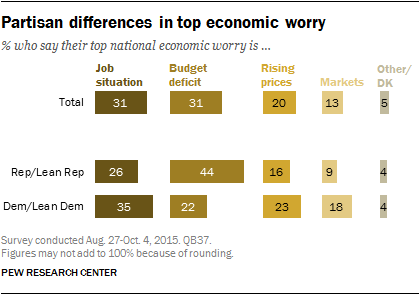
Democrats and leaners are far less likely than Republicans to name the job deficit as their biggest worry: Just 22% say this, about as many say rising prices are their top economic worry (23%). The job situation is cited more frequently (named by 35%), while 18% say the condition of the financial and housing markets is their top economic concern.
Those who say the budget deficit is their top national economic worry are less likely to say the government should do more to solve problems and offer more negative views of the social safety net than those who cite other economic concerns.
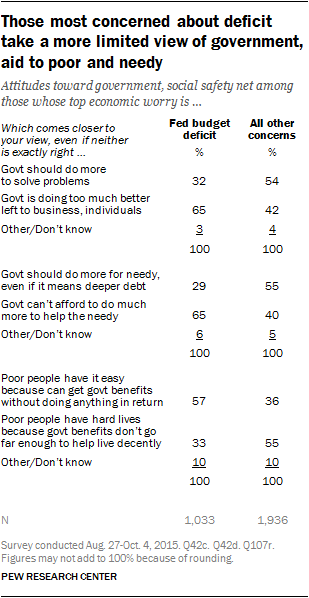
Those most concerned with the deficit are about twice as likely to see government as doing too much that is better left to businesses and individuals (65%) as to say government should do more to solve problems (32%). By contrast, a 55% majority of those who more concerned about other economic worries say the government should do more to solve problems, while 42% say it is doing too much.
When it comes to how much government should do for needy Americans, those whose top economic concern is the deficit are far more likely to say the government can’t afford to do much more to help the needy (65%) than to say it should do more to help even if it means going deeper into debt (29%). By contrast, 55% of those who name issues other than the deficit as their top economic worry say the government should do more to help needy Americans, even if it means going deeper into debt, while 40% say government can’t afford to do much more.
Those most worried about the deficit are more likely to say “poor people have it easy because they can get government benefits without doing anything in return” (57%) than to say “poor people have hard lives because government benefits don’t go far enough to help them live decently” (33%). The balance of opinion is roughly the reverse among those who cite other issues as their top economic worry: 55% of this group says poor people have hard lives because government benefits don’t go far enough to help them live decently, while fewer (36%) say poor people have it easy because they can get government benefits without doing anything in return.
While those who cite the budget deficit as their top economic worry are more Republican than the public overall – and those who cite other economic issues are more Democratic – the relationships between these views persist among both Republicans and Democrats.
Those most concerned about the deficit are modestly more likely to express anger at government. While 22% of the public overall is angry with government, that rises to 28% of those who say the deficit is their top economic worry (compared with 20% of those who name a different top worry). This is also the case among Republicans: 37% of those most concerned about the deficit express anger at government, compared with 31% of Republicans who name another top concern.




